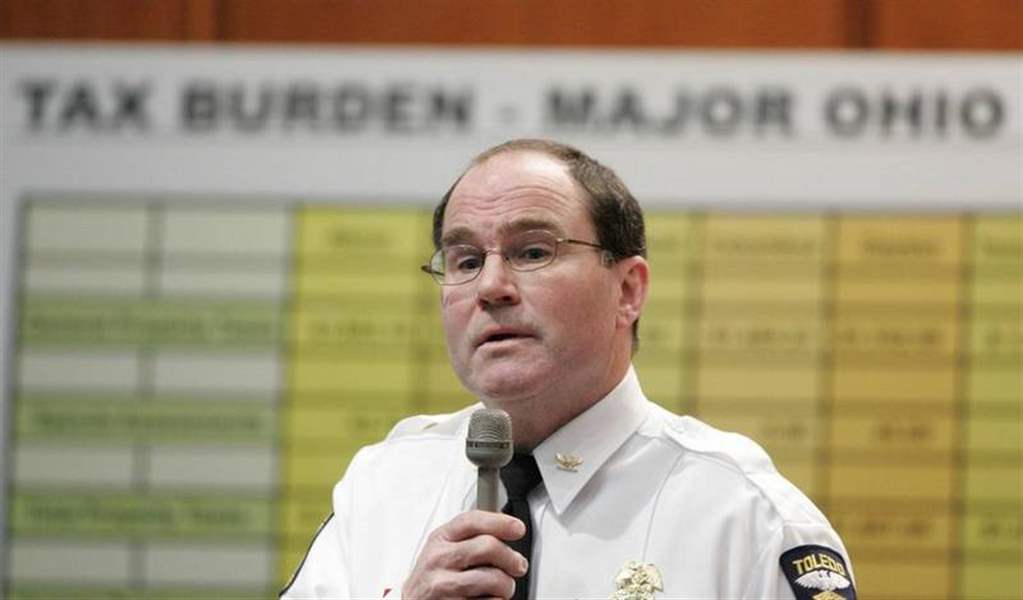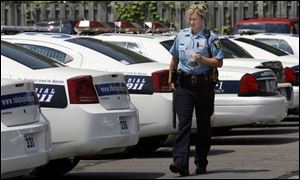
Navarre's plan to cut costs draws ire
7/19/2008
Navarre

A Toledo officer leaves the Northwest District Police Station yesterday. Its patrol officers will work from the other stations.
Residents in West Toledo and other city officials are expressing concern - and even anger - over Chief Mike Navarre's decision to make major operational changes at the Northwest District Police Station in an effort to save the city $500,000.
The changes, formally announced yesterday, include moving the West Toledo station's more than 50 patrol officers from the West Toledo station to the two other stations, closing the city's northwest district police channel, and eliminating one dispatch position at the Lucas County Emergency Services Building.
The changes take effect Wednesday.
The chief stressed that the station at 2330 West Sylvania Ave., near Douglas Road, will remain open. A desk officer will be there to take reports, and detectives in the domestic violence, special victims, and auto squad units will remain as well.
The tough economic climate coupled with the city's budget constraints were cited by the chief as reasons for his decision. He said the move also is aimed at reducing overtime costs.
"This is a business decision," Chief Navarre said. "The world is changing, and we have to change with it."
A shortage of police dispatchers has resulted in substantial amounts of overtime, including $11,000 paid in one weekend. The chief said the dispatch position to be be eliminated had been staffed on overtime "every single day on every single shift."
"The city just doesn't have that amount of money to spend," he said.

Navarre
District 5 Councilman Tom Waniewski called the chief's decision "another slap in the face of hard-working, law-abiding citizens in West Toledo."
Mr. Waniewski said the district station and its parking lot full of police cars act as a deterrent to criminals. Taking that away, he said, could be detrimental to the area.
"Perception is reality," Mr. Waniewski said. "A building doesn't solve crimes, but the perception is important."
Amy Cooper, 28, who lives on Charlestown Avenue with her husband, James, and parents, agreed.
She said having a police station a few streets away, where there are often several police cars in the parking lot, "makes us feel safer."
Mr. Cooper said he understands police aren't able to constantly patrol every part of the city, but said their presence at the district station is important.
Across the street, George Coury, 80, said, "It stays pretty quiet around here with that police station being here."
The Coopers fear, though, that their neighborhood could become a target for crime once the changes are implemented.
"The crime rate is going to go up," Mr. Cooper predicted.
Chief Navarre said, despite concerns, he expects the changes to create a more efficient police operation. He pointed out that, although officers report to their respective district stations for roll call, they don't work from those stations.
"Their workplace is out on the street in a patrol car. That's not changing," he said. "We're not reducing the amount of crews working the area."
In fact, the chief said he potentially would be able to put a few more officers on the street.
Since the Northwest District Station opened in 1997, calls for service citywide have dropped almost 20 percent. The number of officers decreased in the last decade from 737 to 647.
Chief Navarre added that the police department previously worked on a two-channel system and opened a third to accommodate the additional district station.
Dan Wagner, president of the Toledo Police Patrolman's Association, raised concerns that response times could increase as a result of closing one police channel. But Chief Navarre insisted the operational changes will have no effect on response times.
He said response times are his No. 1 priority because citizens get upset by delays.
"When people pick up the phone and dial 911 and want the police, there's an expectation the police will arrive and that they will arrive in a timely manner," Chief Navarre said.
Councilman D. Michael Collins said while he understands the dynamic and economic factors of the decision, he is upset by the way the administration handled it.
Mr. Collins said he was informed of the changes Thursday by a person not in any way associated with city administration.
"We should have had citizen input. There should have been explanation," he said.
The District 2 councilman said he is going to demand the administration hire a police class of 35 officers Oct. 1 as planned. He said it would be a step in the right direction to stabilize the police department.
"I'm not backing down," Mr. Collins said.
While the department expects to hire a police class in October as planned, Chief Navarre reiterated, "Money is extremely tight," and the hire date could be pushed back a few months.
"Every department in the city of Toledo is going to be forced to make decisions similar to the one I made," he said. "They're painful, but they're necessary."
Contact Laren Weber at:
lweber@theblade.com
or 419-724-6050.